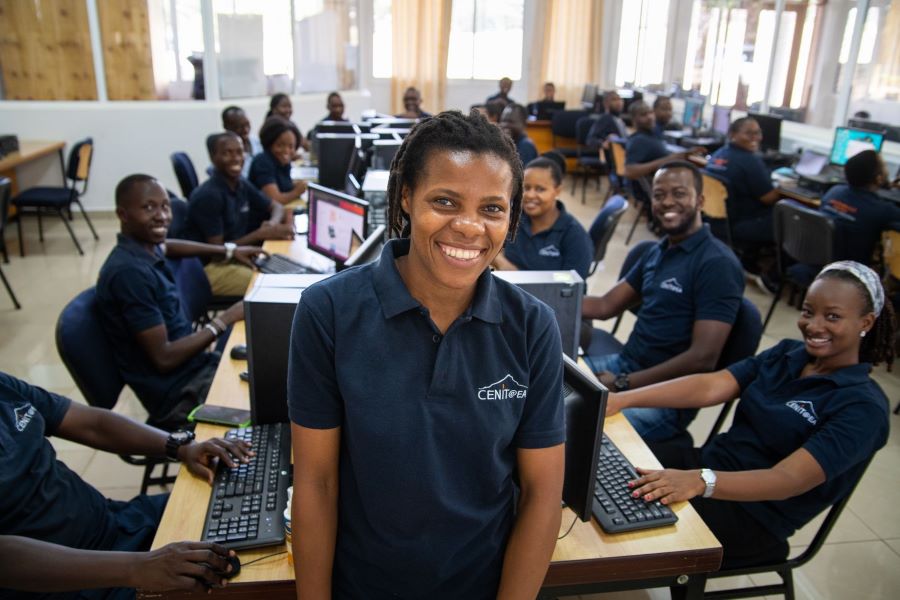
Digital Skills for an Innovative East African Industry (dSkills@EA) Project comes to a close
East African Community Headquarters, Arusha, Tanzania, 26th March, 2025: After three years of transformative work in strengthening digital skills in the East African Community (EAC), the Digital Skills for an Innovative East African Industry (dSkills@EA) Project is scheduled to come to a close on 31st March, 2025.
The dSkills@EA project, implemented by the Inter-University Council for East Africa (IUCEA) and Deutsche Gesellschaft für Internationale Zusammenarbeit (GIZ)with support from the Federal German Government, has significantly impacted digital skills development in the region.
With over 4,000 young East Africans trained, the initiative has fostered a thriving cooperation ecosystem, engaging 300+ private sector partners and 100 universities, building a solid foundation for the future of digital transformation in East Africa.
Beyond these numbers are real people and real impact:
- Rebecca from Tanzania is helping farmers grow better crops and feed more families,
- Keith from Uganda developed a tool to detect strokes earlier that will save lives and
- Malek from South Sudan founded an ICT school, equipping young people with digital skills.
Mr. Ivan Koojo, a former student of the Centre of Excellence for the Innovative East African Industry (CENIT@EA) shared his thoughts about the impact of the project:
“I am proud to be part of the team behind Kayoola EVS, Africa’s first electric bus, built in Uganda. Kiira Motors retained me after my internship. This is the direct impact of investing in East Africa’s human capital. Thank you to the German people, the EAC secretariat, and all the sponsors for believing in us. Your investment is not wasted - we are applying what we learned,” said Mr. Kioo.
The dSkills@EA initiative has strengthened digital skills for employment and innovation among young professionals, students, and entrepreneurs. It has provided entrepreneurship support, short-term digital skills training and enhanced the MSc program in Embedded and Mobile Systems at CENIT@EA, hosted at the Nelson Mandela African Institution of Science and Technology (NM-AIST).
With 164 master’s students enrolled, 124 fully funded scholarships and a 90% graduate employment rate, the programme has laid the foundation for digital transformation in East Africa. Notably, one in five graduates is now teaching at a university, passing on their expertise to the next generation.
In her remarks, Hon. Veronica Nduva, the Secretary General of the EAC, highlighted the importance of scaling up an inclusive digital transformation effort:
“AI and digital transformation are game changers for the future of East Africa. As the first female Secretary-General of the EAC, I have a vision: A future where every young woman can be skilled to lead in technology and innovation. Through our partnership with Germany, we have skilled thousands of young East Africans in digital technologies and worked with hundreds of businesses and universities to create innovations. But we want to go further! That is why we are now building the EAC Regional AI Alliance,” said Hon. Nduva.
Reflecting on Germany’s long-standing partnership with the EAC, Hon. Thomas Terstegen, the German Ambassador to Tanzania and the EAC, said that Germany has been a close partner of the EAC for 25 years, supporting regional integration.
“Through dSkills@EA, we have equipped thousands of young East Africans with digital skills. The impact is clear. Graduates are innovating, teaching, and driving the community. But we are not stopping here. We are now investing in the EAC AI Regional Alliance to ensure East Africa benefits fully from the potential of the digital economy,” said Amb. Terstegen.
In his remarks, Prof. Gaspard Banyankimbona, Executive Secretary of IUCEA, said that the success of dSkills@EA demonstrates the transformative power of demand-driven digital education.
“By aligning the academic curriculum with industry needs, we have significantly enhanced graduate employability and fostered innovation and entrepreneurship. Our commitment to digital skills development continues not only with the launch of the EAC AI Regional Alliance but also working with our over 170 higher institutions of learning to use this module as a use case,” said Prof. Banyankimbona.
Building on the success of dSkills@EA, the EAC AI Regional Alliance will focus on advancing AI research and innovation through regional collaboration, integrate AI into higher education, develop a harmonised regional strategy, and strengthen academia industry partnerships.
On his part, Mr. David Roos, the Project Director of dSkills@EA, highlighted the importance of digital transformation for economic integration:
"dSkills@EA demonstrates the strength of collaboration between governments, academia, and industry. By equipping thousands of young people with future-proof skills, we have laid the groundwork for a thriving digital ecosystem in East Africa. The EAC AI Regional Alliance will build on this success, expanding AI infrastructure and regional capabilities to secure East Africa’s place in the digital future,” said Mr. Roos.
The dSkills@EA project was part of the Federal German Government’s support to EAC regional integration. This success has been achieved through partners, including EAC institutions, NM-AIST, the German Academic Exchange Service, University of Oldenburg, the EAC university consortium, and industry partners.
About dSkills@EA:
The EAC dSkills@EA project, initiated by the East African Community (EAC) Secretariat and German Development Cooperation, aimed to strengthen employment and innovation-related digital skills among young people in EAC Partner States. Implemented by IUCEA and GIZ, the project enhanced the quality of Master's programmes and study-related offerings at CENIT@EA, delivered demand-driven short courses, and supported entrepreneurship and innovation through a network of innovation hubs, universities, and industry
For more information, please contact:
Lillian Akot
Advisor, Communication and Trainings
Digital Skills for an Innovative East African Industry (dSkills@EA)
Deutsche Gesellschaft für Internationale Zusammenarbeit (GIZ) GmbH
P.O. Box 13854
EAC Headquarters
Former State Lodge, EAC Close
Arusha, Tanzania
Tel: +255 744374424
Email: This email address is being protected from spambots. You need JavaScript enabled to view it.
